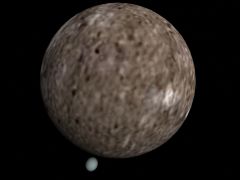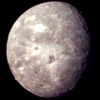Oberon
Oberon is the second largest and second most massive natural satellite of Uranus. It was discovered on 11 January 1787 by William Herschel, and was named after a character from William Shakespeare's A Midsummer Night's Dream. It is one of the five satellites of Uranus discovered prior to the Voyager 2 encounter of January 1986.
Oberon has a radius of 761.4km. Its surface gravity is 0.349m/s^2, 0.036 that of Earth. A surface orbit has a speed of 515m/s, and the escape velocity is 729m/s. A surface orbit has a period of 9283s (about 2 hours 35 minutes).
Oberon's orbit about Uranus is almost perfectly circular and equatorial, and has a radius of 583400km. Its orbital period is 13.463 days. This is the outermost of the five major satellites.
Like all the satellites of Uranus, Oberon's axis is tilted 98° relative to the ecliptic plane. It is locked in synchronous rotation, like the Earth's moon. When Voyager flew past, Uranus and all its satellites were near their southern summer solstice, and in this case it means that only the southern hemispheres were visible. As a consequence, only the southern hemisphere of Oberon has been mapped in any detail.
Oberon has a mean density of about 1.6 times that of water. From this, we can conclude that the satellite is mostly water ice, with a little bit of rock mixed in.
Oberon in Orbiter[edit]
Oberon was first introduced to Orbiter in October 2002 with the release of uranus-neptune-moons.zip add-on, then included into the release of Orbiter 2002-P1. There have been a number of updates since then, the latest with Uranian Moons for Orbiter 2016 in May 2024.
| Add-on | Source | Version | Author | Type | Release Date | Compatibility | Wiki article |
|---|---|---|---|---|---|---|---|
| Orbiter 2016 - torrent files | O-F Resources | 2016 | martins | Orbiter Download | 23 August 2016 | Orbiter 2016 | |
| Orbiter 2016 Core - MSI / EXE edition | O-F Resources | 2016 | martins | Orbiter Download | 23 August 2016 | Orbiter 2016 | |
| Orbiter 2016 Core - ZIP edition | O-F Resources | 2016 | martins | Orbiter download | 23 August 2016 | Orbiter 2016 | |
| Orbiter core package download (The actual download page for Orbiter 2016) |
Orbiter download page | Orbiter 2016 | martins | Orbiter download | 23 August 2016 | Orbiter 2016 | |
| Celestial Bodies Motion - Part 1/4 - v2.0.0 | O-F Resources | v2.0.0 | cristiapi | Scenery | 2 July 2015 | *module only | |
| Orbiter 2010-P1 | O-F Resources | 100830 | martins | Orbiter Download | 30 August 2010 | Orbiter 2010-P1 | |
| Orbiter 2010 | O-F Resources | 100606 | martins | Orbiter Download | 5 June 2010 | Orbiter 2010 | |
| Orbiter 2006-P1 | O-F Resources | 060929 | martins | Orbiter Download | 29 September 2006 | Orbiter 2006-P1 | |
| Orbiter 2006 | O-F Resources | 060504 | martins | Orbiter Download | 4 May 2006 | Orbiter 2006 | |
| The Outer Planets 050329 Update | AVSIM | 050329 | Rolf Keibel Tony Dunn Carl Romanik |
Scenery | 30 March 2005 | ||
| The Outer Planets 050223 Update | O-F Resources | 2005-02-23 | VF2_Rolf | Scenery | 23 February 2005 | ||
| The Outer Planets 050125 | AVSIM | 050125 | Rolf Keibel Tony Dunn |
Scenery | 26 January 2005 | Orbiter 2005-P1 | |
| 2005 (with P1 patch files) | O-F Resources | 050216 | martins | Orbiter Download | 16 February 2005 | Orbiter 2005 | |
| Orbiter 2003-P2 | O-F Resources | 031217 | martins | Orbiter Download | 17 December 2003 | Orbiter 2003-P2 | |
| Orbiter 2003-P1 | O-F Resources | 031105 | martins | Orbiter Download | 5 November 2003 | ||
| Uranus / Neptune Moons Addon | AVSIM | Robert Stettner (Foxtrot) | Scenery | 12 October 2002 | |||
Voyager 2 image of Oberon
From Wikimedia Commons.
| Uranus's natural satellites |
|---|
| Named Satellites:
Ariel | Belinda | Bianca | Caliban | Cordelia | Cressida | Cupid | Desdemona | Ferdinand | Francisco | Juliet | Mab | Margaret | Miranda | Oberon | Ophelia | Perdita | Portia | Prospero | Puck | Rosalind | Setebos | Stephano | Sycorax | Titania | Trinculo | Umbriel Numbered Satellites: |
| See also: Pronunciation key | rings of Uranus |
| edit The Solar System | |
|---|---|
| Central star |
Sun (Sol) |
| Planets |
Mercury - Venus - Earth - Mars - Jupiter - Saturn - Uranus - Neptune |
| Natural satellites |
Moon - Phobos - Deimos - Io - Europa - Ganymede - Titan - more... |
| Add-ons |
Planets - Dwarf Planets - Small objects - Natural satellites - Alternative star systems |









